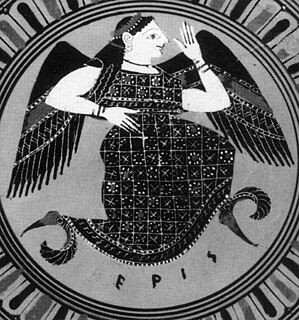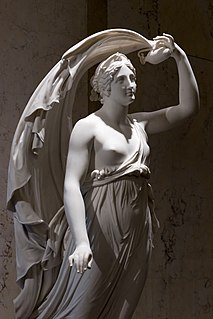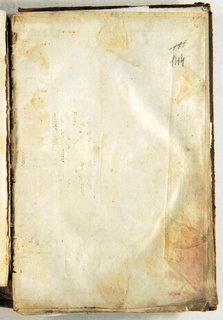
Eris is the Greek goddess of strife and discord. Her Roman equivalent is Discordia, which means the same. Eris's Greek opposite is Harmonia, whose Roman counterpart is Concordia. Homer equated her with the war-goddess Enyo, whose Roman counterpart is Bellona. The dwarf planet Eris is named after the goddess.

In ancient Greek religion, Hera is the goddess of marriage, women and family, and the protector of women in childbirth. In Greek mythology, she is queen of the twelve Olympians and Mount Olympus, sister and wife of Zeus, and daughter of the Titans Cronus and Rhea. One of her defining characteristics in myth is her jealous and vengeful nature in dealing with any who offend her, especially Zeus' numerous adulterous lovers and illegitimate offspring.

Zeus is the sky and thunder god in ancient Greek religion, who rules as king of the gods of Mount Olympus. His name is cognate with the first element of his Roman equivalent Jupiter. His mythology and powers are similar, though not identical, to those of Indo-European deities such as Jupiter, Perkūnas, Perun, Indra, and Dyaus.

Io was, in Greek mythology, one of the mortal lovers of Zeus. An Argive princess, she was an ancestor of many kings and heroes, such as Perseus, Cadmus, Heracles, Minos, Lynceus, Cepheus, and Danaus. The astronomer Simon Marius named a moon of Jupiter after Io in 1614.

In Greek mythology, Inachus,Inachos or Inakhos was the first king of Argos after whom a river was called Inachus River, the modern Panitsa that drains the western margin of the Argive plain.

In ancient Greek religion and mythology, Iris is a daughter of the gods Thaumas and Electra, the personification and goddess of the rainbow and messenger of the gods, a servant to the Olympians and especially Queen Hera. Iris appears in several stories carrying messages from and to the gods or running errands, but has no unique mythology of her own. Similarly, very little to none of a historical cult and worship of Iris is attested in surviving records, with only few traces surviving from the island of Delos. In ancient art, Iris is depicted as a winged young woman carrying a caduceus, the symbol of the messengers, and a pitcher of water for the gods. Iris was traditionally seen as the consort of Zephyrus, the god of the west wind and one of the four Anemoi, by whom she is the mother of Pothos in some versions.

The Aldeburgh Festival of Music and the Arts is an English arts festival devoted mainly to classical music. It takes place each June in the Aldeburgh area of Suffolk, centred on Snape Maltings Concert Hall.

Argus Panoptes or Argos is a many-eyed giant in Greek mythology.
Jealousy in religion examines how the scriptures and teachings of various religions deal with the topic of jealousy.

Punch and Judy is a chamber opera with music by Harrison Birtwistle and a libretto by Stephen Pruslin, based on the puppet figures of the same names. Birtwistle wrote the score from 1966 to 1967. The opera was first performed at the Aldeburgh Festival, which had commissioned the work, on 8 June 1968, with David Atherton conducting the English Opera Group. The premiere cast included John Cameron as Mr Punch.

Poseidon is the name of a DC Comics deity who is based on the Greek god of the same name. Due to his status as Greek god of the sea, the character has figured primarily in stories relating to two of DC Comics' main superhero properties: Wonder Woman and Aquaman.

"Down to Earth" is a Wonder Woman story arc, marking the start of writer Greg Rucka's four-year run on Wonder Woman.

The Incredible Hercules was an ongoing comic book series written by Greg Pak and Fred Van Lente and published by Marvel Comics. The series starred the mythological superhero Hercules, his sidekick Amadeus Cho, the seventh-smartest person in the world, and half-sister Athena.
Graeme Peter Crump, known professionally as Peter Graeme and as 'Timmy' Crump to friends and family, was an English oboist and academic teacher. He was best known as the principal oboist of the Melos Ensemble.

Dialogues of the Gods are 25 miniature dialogues mocking the Homeric conception of the Greek gods written in the Attic Greek dialect by the Greek author Lucian of Samosata. There are 25 dialogues in total. The work was translated into Latin c. 1518 by Livio Guidolotto, the apostolic assistant of Pope Leo X.

The Corridor is a chamber opera composed by Harrison Birtwistle to an English language libretto by David Harsent. It premiered at the Aldeburgh Festival on 12 June 2009. The title refers to the corridor through which Orpheus and Eurydice passed as he was leading her from the underworld.
Elizabeth Atherton is a British lyric soprano. Born and brought up in London, she is the daughter of conductor David Atherton. She studied at Trinity College, Cambridge and at the Royal Scottish Academy of Music and Drama with Patricia MacMahon. She is a winner of the Maggie Teyte Prize and the Handel Singing Competition.

Andrew Watts is a British classical countertenor.
Joseph Phibbs is an English composer of orchestral, choral and chamber music. He has also composed for theatre, both in the UK and Japan. Since 1998 he has written regularly to commissions for Festivals, for private sponsors, and for the BBC, which has broadcast premieres of his orchestral and chamber works from the Proms and elsewhere. His works have been given premieres in Europe, the United States and the Far East, and he has received prestigious awards, including most recently a British Composer Award, and a Library of Congress Serge Koussevitzky Music Foundation Award. Many of his works have been premiered by leading international musicians, including Dame Evelyn Glennie, Esa-Pekka Salonen, Leonard Slatkin, Sakari Oramo, Vasily Petrenko, Gianandrea Noseda, and the Belcea Quartet.















